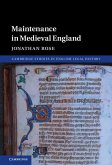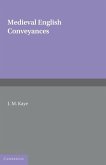This book explores the role of mens rea, broadly defined as a factor in jury assessments of guilt and innocence from the early thirteenth through the fourteenth century - the first two centuries of the English criminal trial jury. Drawing upon evidence from the plea rolls, but also relying heavily upon non-legal textual sources such as popular literature and guides for confessors, Elizabeth Papp Kamali argues that issues of mind were central to jurors' determinations of whether a particular defendant should be convicted, pardoned, or acquitted outright. Demonstrating that the word 'felony' itself connoted a guilty state of mind, she explores the interplay between social conceptions of guilt and innocence and jury behavior. Furthermore, she reveals a medieval understanding of felony that involved, in its paradigmatic form, three essential elements: an act that was reasoned, was willed in a way not constrained by necessity, and was evil or wicked in its essence.
Dieser Download kann aus rechtlichen Gründen nur mit Rechnungsadresse in A, B, BG, CY, CZ, D, DK, EW, E, FIN, F, GR, HR, H, IRL, I, LT, L, LR, M, NL, PL, P, R, S, SLO, SK ausgeliefert werden.









